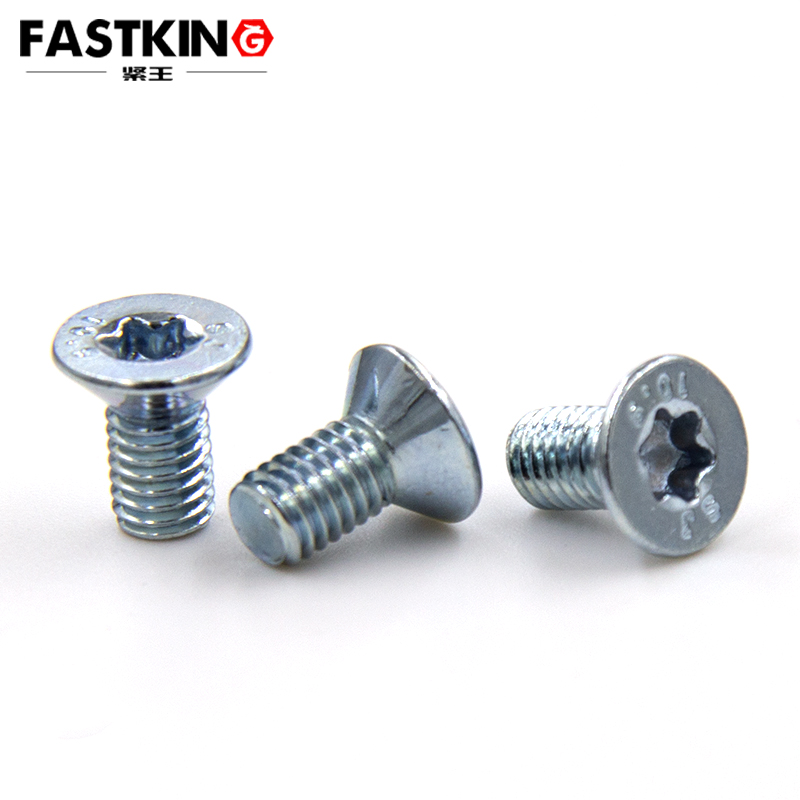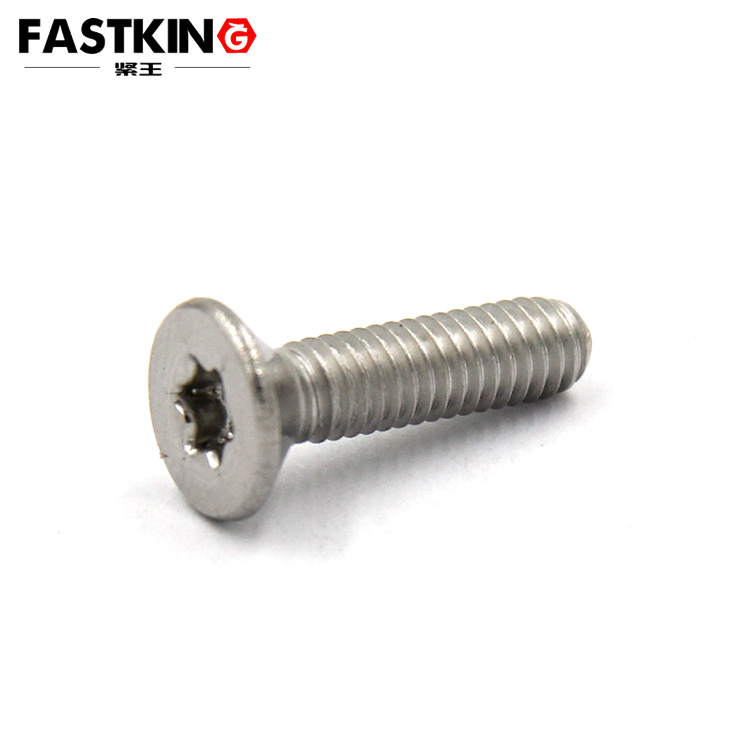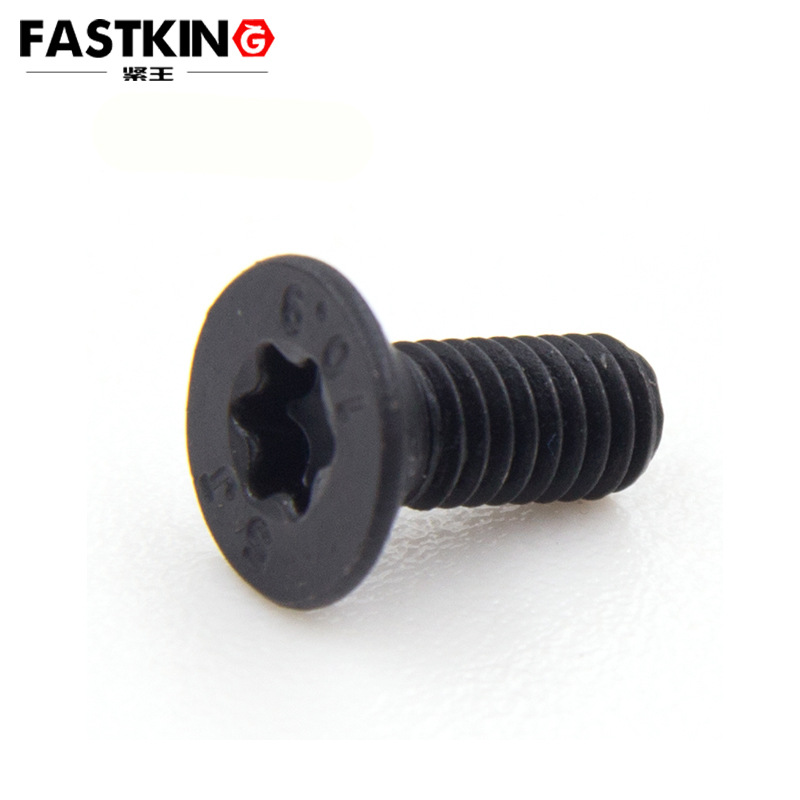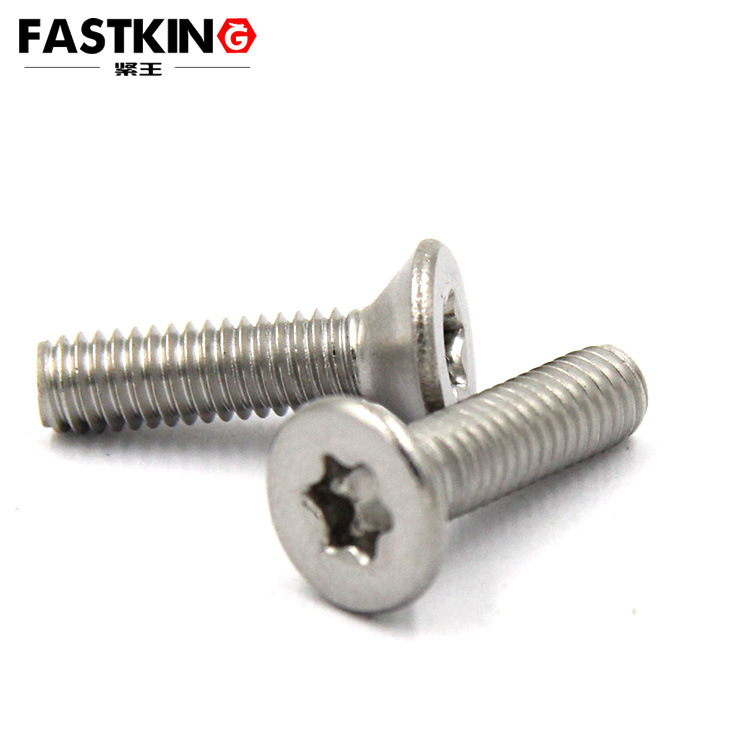- Torx screw,torx machine screw,torx self tapping screw
- sales@jlfastener.com
torx flat head machine screw
Torx machine screw
torx flat head machine screw
- Description:In the field of fasteners, the countersunk-head inner plum blossom machine screw has become an ideal choice for many scenarios requiring high surface flatness and connection stability, thanks to its u
Materials: From Basic Durability to High-Strength Adaptation
1.Stainless Steel: The "Corrosion-Resistant Benchmark" for Humid Scenarios
Stainless steel remains the preferred basic material for countersunk-head inner plum blossom machine screws, mainly including grades 304 and 316. 304 stainless steel contains chromium and nickel elements, which can form a stable oxide film on the surface to isolate moisture and air, making it suitable for humid environments such as bathrooms and kitchens. For example, when fixing bathroom cabinets to walls, 304 stainless steel countersunk screws can resist moisture erosion for a long time, preventing cabinet loosening caused by rust. Meanwhile, the "hidden" design does not damage the overall aesthetics of the bathroom.
316 stainless steel, with the addition of molybdenum, has further improved corrosion resistance. It can be used in scenarios with high salt spray concentrations, such as outdoor furniture and marine equipment. Even when exposed to sea breeze for a long time, it can still maintain stable fastening performance.
2. Carbon Steel: The "Strength-Enhanced" Cost-Effective Option
After modulation treatment (quenching + tempering), carbon steel can reach a hardness of HRC 35-45, featuring both high strength and cost-effectiveness. It is a common choice in machinery manufacturing and construction hardware. For instance, in the connection of protective covers for small machine tools, carbon steel countersunk screws can withstand the vibration load during equipment operation, ensuring the protective cover fits tightly and preventing dust and debris from entering the machine tool interior.
However, carbon steel has poor corrosion resistance and needs to be paired with surface treatment. Untreated carbon steel screws are prone to rust in humid environments, but after black zinc or zinc-nickel alloy treatment, their weather resistance can be significantly improved to adapt to more scenarios.
3. Alloy Steel: The "Performance Leader" for High-End Scenarios
The newly added alloy steel is an upgraded solution developed for high-strength and high-wear resistance requirements. By adding alloying elements such as manganese, chromium, and vanadium to the steel, alloy steel has much higher tensile strength and impact toughness than stainless steel and carbon steel, enabling it to withstand extreme loads and high-frequency vibrations.

In the automotive engine compartment, the high temperature (up to over 150℃) and high-frequency vibration during engine operation impose strict requirements on fasteners. Alloy steel countersunk screws can maintain stable fastening in such harsh environments, preventing component loosening due to material fatigue and ensuring the safe operation of the engine. Additionally, in the connection of hydraulic systems for construction machinery, alloy steel screws can also resist high-pressure impact, prevent hydraulic oil leakage, and improve equipment reliability.
Surface Treatment: From Protection to Functional Customization
1. Silver: A Balance of Aesthetics and Basic Protection
Silver surface treatment includes two types: stainless steel's natural color and nickel plating. Its core advantage lies in balancing aesthetics and basic protection. The natural color of stainless steel retains the material's inherent metallic luster, making it suitable for scenarios with aesthetic requirements such as furniture and home appliances. For example, when fixing the drawer slides of wooden wardrobes, silver countersunk screws coordinate well with wood and metal slides, hiding the screw heads while enhancing texture.
Nickel plating forms a uniform nickel layer on the surface. In addition to increasing gloss, it can also isolate air and delay oxidation. It is suitable for connecting the outer casings of electronic devices such as computer cases and printers, ensuring no obvious discoloration on the screw surface after long-term use.
2. Black Zinc: The "Protective Armor" for Wear-Prone Scenarios
Black zinc treatment forms a black zinc layer on the screw surface through chemical conversion. It has high hardness and strong wear resistance, capable of withstanding frequent friction and slight impacts. In the assembly of tool handles, such as the connection between the handles of screwdrivers/wrenches and metal rods, black zinc countersunk screws can withstand the friction caused by long-term holding and forceful operation, avoiding disassembly difficulties due to head wear.
At the same time, the black appearance matches the industrial style of tools and can hide minor scratches, keeping the product's appearance clean. Furthermore, the black zinc layer also has a certain degree of corrosion resistance, which can meet the protection needs of ordinary carbon steel screws in dry indoor environments.
3. Blue-White Zinc: The "New Cost-Effective Corrosion-Resistant Option"
The newly added blue-white zinc treatment forms a blue-white passivation film on the zinc layer surface. It combines corrosion resistance and economy, filling the scenario gap between silver and black zinc. The salt spray test resistance time of blue-white zinc can reach 48-72 hours, which is better than ordinary nickel plating, and its cost is lower than that of zinc-nickel alloy. It is suitable for scenarios such as indoor electrical appliances and office furniture.

For example, when fixing the outer casing of air conditioning indoor units, blue-white zinc countersunk screws can resist the erosion of humid indoor air, preventing the casing from loosening due to screw rust. Meanwhile, the blue-white appearance coordinates with the color of the air conditioner body, without affecting the overall aesthetics.
4. Zinc-Nickel Alloy: The "Corrosion-Resistant Ace" for Harsh Environments
Zinc-nickel alloy treatment is currently the solution with the strongest corrosion resistance, with a salt spray test resistance time of over 500 hours, far exceeding other surface treatments. It forms a dense protective layer through the zinc-nickel alloy coating, which can resist corrosive media such as rainwater, salt, and chemicals. It is suitable for harsh scenarios such as automotive chassis and marine equipment.
The automotive chassis is exposed to rainwater and road salt for a long time, and zinc-nickel alloy countersunk screws can effectively prevent rust, avoiding the falling off of chassis components due to screw failure. In the fixation of lighting equipment on offshore platforms, even when exposed to sea breeze and seawater erosion for a long time, the zinc-nickel alloy-treated screws can still maintain fastening performance, ensuring the safe operation of the equipment.
From the diversified upgrading of materials to the functional segmentation of surface treatment, the adaptability of countersunk-head inner plum blossom machine screws has been continuously improved. The corrosion resistance of stainless steel, the cost-effectiveness of carbon steel, and the high strength of alloy steel, combined with the aesthetics of silver, the wear resistance of black zinc, the cost-effectiveness of blue-white zinc, and the corrosion resistance of zinc-nickel alloy, form a full-scenario solution covering daily home use to high-end industry. In the future, with the advancement of material technology and surface treatment technology, countersunk-head inner plum blossom machine screws will further break through performance boundaries and play a core role in "hidden fastening" in more precision manufacturing fields.
- PREVIOUS:torx pan head machine screw
- NEXT:Torx ultra low profile screw



